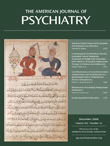Abstract
Objective: Cognitive impairments associated with schizophrenia might be expected to have a marked impact on the ability to produce coherent speech, yet associations between cognitive performance and speech disorder have typically been weak. Findings on this question may have been limited by measurement methods and by the heterogeneity of speech disorder. This study examined the contributions of impairments in sustained attention and sequencing abilities to schizophrenic speech disorder, measured in terms of communication failures and divided into different types of disorder. Method: Samples of natural speech were collected from severely ill inpatients with schizophrenia and nonpsychiatric comparison subjects and rated for frequencies of six types of communication failures: four structural and two nonstructural types. Subjects also completed a battery of cognitive tests assessing several facets of attention and sequencing ability. Hierarchical regression was used to identify cognitive contributors to communication failures. Results: Impaired sustained attention was associated with more frequent structural and nonstructural communication failures. As predicted, impaired sequencing, and in particular conceptual sequencing, also made a substantial contribution to the structural communication failures, but not to the nonstructural ones. These findings held when global level of impairment was controlled statistically. Performance on the tests of attention and sequencing explained 56% of the variance in structural speech disorder. Conclusions: Schizophrenic speech disorder is heterogeneous in form and in cognitive underpinnings. Impairments in attention and sequencing abilities are highly predictive of communication failures related to language structure.



